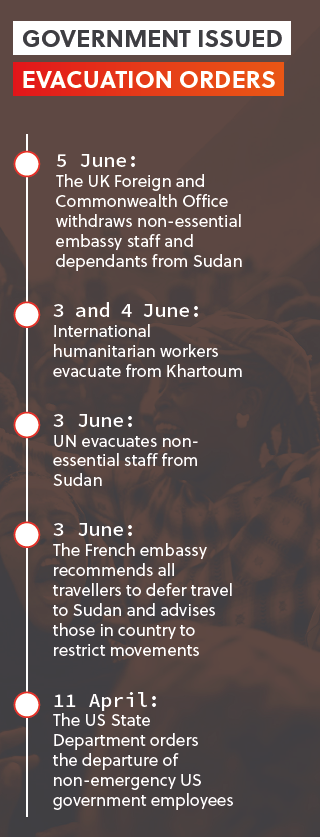On a Knife's Edge: A Post-Al Bashir Sudan

Following four months of sustained protests in cities across the country, the 9 April military ousting of long-serving president Omar Al Bashir beckoned a new era for Sudan. The public, civil society and the international community alike were optimistic that the country would usher in a new democratic regime. However, the political transition has proved more challenging. Despite early progress in securing a roadmap for Sudan’s reform, talks between the interim ruling body, the Military Transitional Council (MTC), and the civil society coalition, the Forces for the Declaration of Freedom and Change (FDFC), have collapsed several times. Defiant in their bid to secure a civilian-led administration, the FDFC continued protests in Khartoum post-April, while an increasingly bellicose MTC began to crackdown on dissidence. Now, with both the MTC and FDFC splintering, Sudan appears to be on the brink of war.
In light of the many stakeholders in play, severe economic challenges, a complex history of war, marginalisation and human rights abuses, resolving this crisis will be difficult. This introduces significant uncertainty for commercial operators in the country.
The Road to Crisis
The widespread protests witnessed in Khartoum between December 2018 and April 2019 were the latest display of persistent anti government sentiment and socio-economic hardships which have provoked several outbreaks of popular unrest in Sudan since 2013. Previously, through his reliance on the armed forces — specifically the Rapid Support Forces (RSF) paramilitary group — Al Bashir was able to curb any popular uprising. On 9 April, however, the tide turned against Al Bashir when the military, under the leadership of Minister of Defence Lieutenant General Ahmed Awad Ibn Auf, moved against the regime. While initially supportive of the military’s efforts, the public was eager to quickly secure a civilian-led transitional government. In the face of unrelenting protests, Lt. Gen. Awad Ibn Auf stepped down from the newly established MTC, paving the way for military head, Lt Gen Abdel Fattah Abdelrahman Burhan, and the head of the RSF, General Mohamed Hamdan Dagalo, to lead the transitional body.
Although the MTC was first willing to make concessions to ensure an amicable transition, Burhan and Dagalo have become more steadfast in seeking to secure influence for the military elite. The MTC and FDFC agreed to numerous negotiation efforts over the course of May to establish a way forward, but these proved unfruitful. Then, in a clear tipping point to the crisis, on 3 June, the RSF, under the direction of Dagalo, launched an operation to dismantle protest camps in Khartoum. The operation quickly escalated into violence. The opposition claims that at least 128 people were killed in associated violence, while the Ministry of Health stated that the official death toll is 61. An MTC-led investigation has since been launched into the RSF’s actions amid allegations of human rights abuses and sexual violence.
While tensions continued to fluctuate through June and July, a 19 July deal between the MTC and FDFC appears to have, for now, eased hostilities. In accordance with the latest deal, a sovereign council comprising five military and five civilian representatives, and one joint representative, will govern until elections in 2022. Yet, the road ahead will be complicated by the individual wills of the array of civilian and military leaders now at the table.
Meddling Across Borders
In an effort to avoid a worsening crisis in Sudan, the international community moved to condemn the recent violence and repeatedly called for renewed negotiations. In response to the 3 June violence, the African Union suspended Sudan from the bloc until a civilian government is established, and the United Nations Security Council subsequently condemned the violence, despite some initial pushback from China and Russia.
Yet, despite this international condemnation, regional players including Saudi Arabia, Egypt and the United Arab Emirates (UAE) have instead backed the MTC. Specifically, Saudi Arabia remains supportive of Dagalo, particularly after RSF forces reinforced Saudi Coalition efforts against the Houthi forces in Yemen. Meanwhile, the UAE and Egypt back Burhan. This regional support could prop up the MTC going forward, giving the military body disproportionate influence in the joint sovereign council.

Splintered Stakeholders and the Threat of Civil War
Thus far, the MTC and the FDFC have each presented a unified front when facing each other at the negotiating table. Now, these united bodies are splintering. The FDFC has been divided on a way forward, while the rebel coalition Sudan Revolutionary Front has refused to join the body. More concerning, however, are the emerging divisions within the MTC. The RSF, in particular, will serve as a dangerous kingmaker in securing the MTC’s agenda. Accustomed to preferential treatment under the Al Bashir regime and well-rehearsed in human rights abuses under its predecessor — the Janjaweed militia, which stood accused of genocide in Darfur — the RSF will be a dangerous actor in Sudan’s political future. Already, on 16 July, the MTC stated that 16 military personnel had attempted to carry out a mutiny. Similar powerplays remain likely going forward. As these rivals vie for power in the absence of a democratically elected government, the potential for civil war in the country will increase.
Outlook
The road ahead will be a challenging one. Any prolonged peace process will need to secure the support of all interest groups within both the FDFC and the MTC while simultaneously encompassing peripheral actors such as the Sudan Revolutionary Front. Yet, in the absence of a trusted negotiation process, an escalation in violence is likely. Meanwhile, divisions in the MTC will increase the potential for coup attempts, exacerbating current instability. As such, the operating environment in Sudan is likely to remain uncertain in the coming months. Commercial operators will need to be prepared to respond swiftly to a deterioration in security by staying abreast of key developments and ensuring evacuation procedures are in place and have been accurately vetted.
